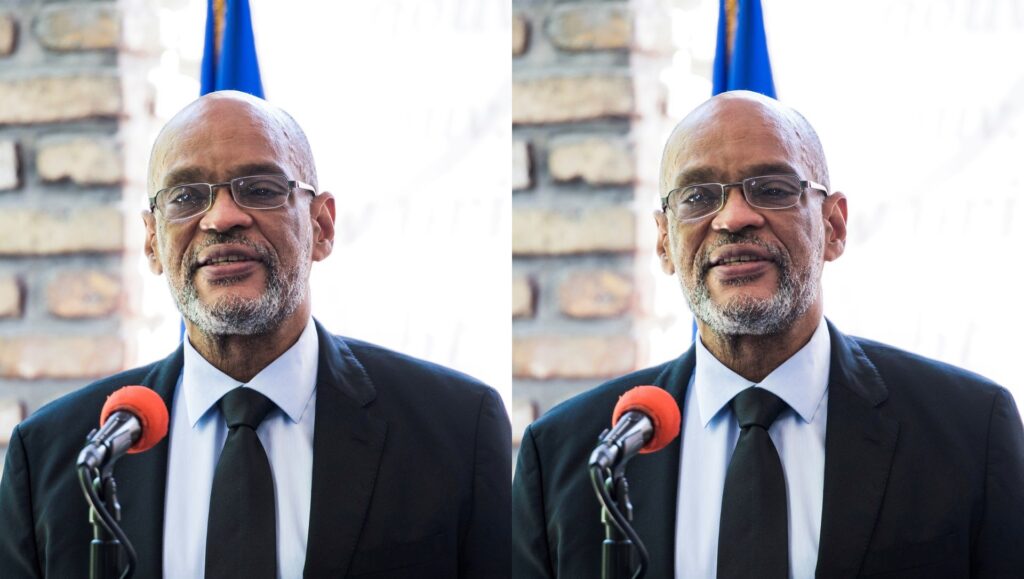PORT-AU-PRINCE — The investigation into the assassination of the Haitian president Jovenel Moïse has taken a sensational turn after the country’s chief prosecutor asked a judge to charge Haiti’s prime minister in connection with the crime.
Ariel Henry, a 71-year-old neurosurgeon, became Haiti’s principal leader in July, two weeks after Moïse was killed at his home in the capital Port-au-Prince.
Supporters describe Henry as an upstanding member of Haiti’s medical community who had been grappling with the unenviable task of trying to stabilize a country rocked by the murder of its president and then a 7.2-magnitude earthquake that killed more than 2,000 people. But on Tuesday Haiti’s prime minister was sucked into the heart of the alleged plot behind Moïse’s murder as the country’s chief prosecutor, Bed-Ford Claude, asked a judge to charge him with suspected involvement.
“There are enough compromising elements … to prosecute Henry and ask for his outright indictment,” Claude wrote in the official request, according to the Associated Press.
The Haitian newspaper Le Nouvelliste said Claude had also asked immigration officials to prevent Henry from leaving the country because of the “gravity” of the facts that had emerged.
Haiti’s prime minister made no immediate comment. But last weekend, amid reports that murder investigators wanted to quiz him about telephone conversations he was alleged to have had with one of their chief suspects, Haiti’s leader vowed he would not be distracted from his mission and insisted “the real culprits” would be tracked down and punished.Guns, gangs and foreign meddling: how life in Haiti went from bad to worse.
In the two-page request he submitted on Tuesday, Claude claimed Henry had spoken to the former justice ministry official Joseph Felix Badio for at least seven minutes following Moïse’s 7 July shooting. Henry was allegedly at Port-au-Prince’s Hotel Montana at the time while Badio was thought to have been speaking from somewhere near Moïse’s residence. Badio has yet to be apprehended and his current whereabouts are unknown.
More than two months after the assassination much about the killing remains a mystery.
Dozens of suspects have been arrested, including 18 former Colombian soldiers – some of whom were among the assault team that swept into Moïse’s residence in the early hours 7 July. Police have claimed that one key conspirator was Christian Emmanuel Sanon, a Florida-based pastor with an apparent plan to take over as Haiti’s leader. But few believe the real masterminds have been identified, let alone caught.
In an interview with the New York Times, the widow of the slain president said she suspected wealthy “oligarchs” were responsible for a crime that has shaken an already fragile and impoverished nation struggling with a series of interlinked economic, political, humanitarian and security crises.
Haiti’s chief public prosecutor has asked the judge overseeing the investigation into the assassination of President Jovenel Moise to charge Prime Minister Ariel Henry as a suspect and ordered migration services not to let him leave the country.
In a letter to Judge Garry Orelien, prosecutor Bed-Ford Claude said phone records showed Henry twice communicated with a key suspect in Moise’s killing on the night of the crime on July 7. That suspect, a former justice ministry official whom Henry has publicly defended, is now on the run.
Henry should be “forbidden from leaving the national territory by air, sea or road due to serious presumption relative to the assassination of the president,” Claude wrote in a letter to the country’s Migration Services.
Chenald Augustin, who works in the prime minister’s communications office, said it did not have an immediate comment. The premier last week dismissed the charges against him as politicking.
Moise was shot dead when assassins stormed his private residence in the hills above Port-au-Prince, plunging the impoverished Caribbean country deeper into turmoil and a political vacuum.
The 53-year old former provincial businessman had been governing by decree for more than a year after Haiti failed to hold legislative and municipal elections amid a political gridlock and had faced many calls to step down.
Decades of political instability as well as natural catastrophes have plagued Haiti’s development. Its aid-dependent economy is the poorest in the Americas, more than a third of Haitians face acute food insecurity, and gangs have turned swathes of the capital into no go areas.
Claude had invited Henry on Friday to meet with him to discuss the phonecalls with the suspect, noting that he could only summon the premier on presidential orders, but that the country remained without a president.
Haiti’s Office of Citizen Protection demanded on Saturday Henry step down and hand himself over to the justice system.
Henry retorted on Twitter that “no distraction, invitation, summons, maneuver, menace or rearguard action” would distract him from his work.
The prime minister announced on Saturday that Haiti’s main political forces had reached an agreement to establish a transition government until the holding of presidential elections and a referendum on whether to adopt a new constitution next year.
The agreement establishes a Council of Ministers under Henry’s leadership.
A constituent assembly made of 33 members appointed by institutions and civil society organizations will have three months to prepare the new constitution.
Moise’s own attempts at holding elections and a constitutional referendum were attacked for being too partisan. Critics called them veiled attempts at installing a dictatorship.
His supporters said he was being punished for going after a corrupt ruling elite and seeking to end undue privileges.Reporting by Sarah Marsh; Editing by Steve Orlofsky and Rosalba O’Brien
Our Standards: The Thomson Reuters Trust Principles.

